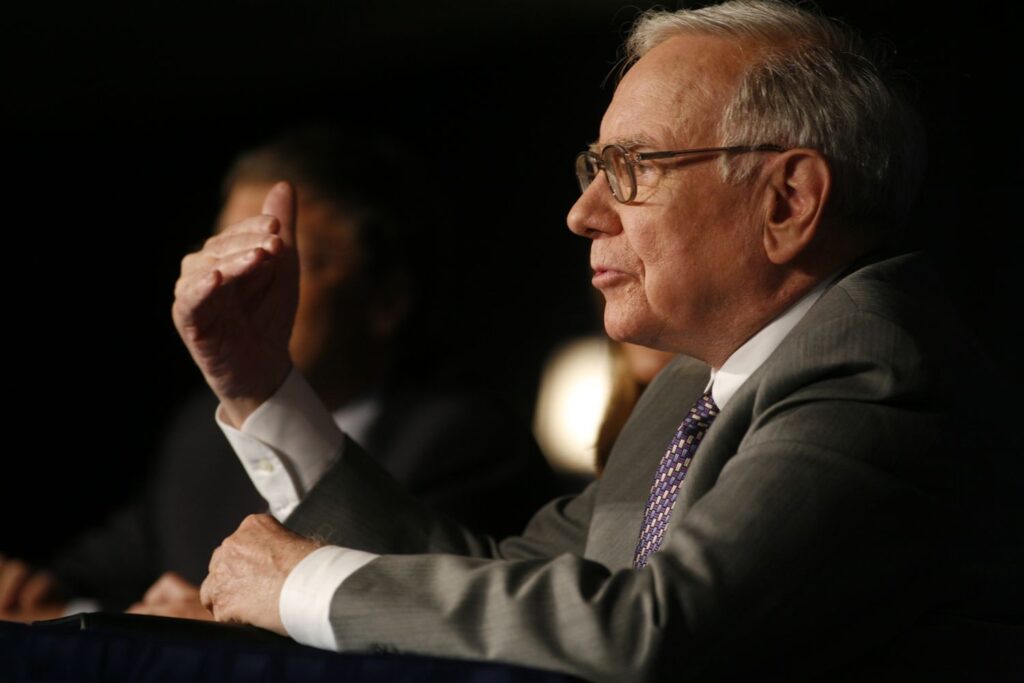:max_bytes(150000):strip_icc():format(jpeg)/GettyImages-2175677488-05c1c327dbb34f6baf4d10d2c714f033.jpg)
Key Takeaways
- Warren Buffett has pointed out that book value can significantly misstate the intrinsic value of a business.
- He prefers using intrinsic value, “the discounted value of the cash that can be taken out of a business during its remaining life.”
- Buffett goes so far as to say, “In all cases, what is clear is that book value is meaningless as an indicator of intrinsic value.”
Warren Buffett has repeatedly reminded investors that book value is often a poor measure of a business.
The calculation itself is simple: take the total assets minus liabilities. But book value, Buffett says, frequently misrepresents reality, whether by overstating or understating what a business is truly worth.
Over the years, Buffett has written about the shortcomings of using book value per share (BVPS) to value Berkshire Hathaway. As chair of the company, Buffett has preferred to focus on a company’s intrinsic value instead.
Buffett: Book Value Is a Limited Tool
Warren Buffett believed that book value, although an easily calculable number, is of limited use. For businesses where Berkshire Hathaway had full control, for example, the carrying value of those assets on the balance sheet could be far different from the businesses’ true intrinsic value.
Buffett described how Berkshire’s book value per share in 1964 was $19.46, but that the intrinsic value of the business at the time was far less because the company’s textile assets were worth less than their stated values.
Fast forward to December 2001, and book value per share had grown to nearly $38,000, and almost $100,000 by December 2011. However, those figures actually understated the intrinsic value of the company, with the stock’s price-to-book ratio falling from around 2.0 to 1.15 over the same ten years. As Buffet noted, most of Berkshire Hathaway’s underlying businesses were “worth far more than their carrying values.”
The moral of the story: book value can mislead in both directions. It can overstate or understate the true value of a business.
Book Value vs. Intrinsic Value vs. Market Price
- Intrinsic value is “the discounted value of the cash that can be taken out of a business during its remaining life.” This is an estimate, and as such is subjective and sensitive to both interest rates and future cash-flow assumptions. But it is the only logical basis for valuation, Buffett says.
- Book value is an accounting measure and not a reflection of a business’s real economic value. At Berkshire Hathaway, Buffett only uses the change in book value per share as a rough proxy to track changes in intrinsic value, but cautions investors to never confuse the two.
- Market price is a third number that can get in the way, as it often reflects short-term market sentiment more than anything else.
Buffett’s Way of Doing Business
“[B]usinesses logically are worth far more than net tangible assets when they can be expected to produce earnings on such assets…”, Buffett wrote. He prefers to measure a business’s “economic” performance, which is far superior to tracking its book value or even its earnings per share.
Look-Through Earnings
To assess a firm’s economic performance, Buffett likes to focus on the look-through earnings, rather than accounting constructs.
To make his point, Buffett has used the analogy of a college education. The tuition paid and lost income and experience while attending school is the “book value.” The relevant value, however, is the present value of the lifetime incremental earnings that the degree makes possible. For some, the intrinsic value (i.e., economic payoff) is greater than the price (cost). For others, it’s not. The analogy emphasizes his overall point: focus on intrinsic value rather than cosmetic accounting. In either case, the book value concept has no real use in assessing one’s professional value creation.
The Bottom Line
Book value is a poor way to judge a business, according to Buffett. As an accounting number, it can serve as a directional indicator at times but may be misleading. It might overstate the value of troubled assets, for example, but it can also easily understate the value of businesses with hard-to-account-for intangible assets. The better guide to the value of a business is intrinsic value, Buffett says. While it’s harder to calculate, it’s rooted in the value of future cash flows.


